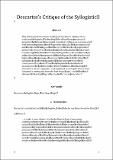Descartes's critique of the syllogistic
Abstract
This article presents a novel reading of Descartes’s critique of the traditional syllogistic. The reading differs from those previously presented by scholars who regard Descartes’s critique as a version of a well-known argument: that syllogisms are circular or non-ampliative and thus trivial. It is argued that Descartes did not see syllogisms as defective in themselves. For him the problem was rather that anyone considering a valid and informative syllogism must already know, by an intuition wholly independent of the syllogism, that the conclusion follows from the premises. Moreover, without such an intuition the syllogistic on its own is incapable of determining whether the consequence truly holds. Thus the syllogistic is useless unless accompanied by an intuition that renders it otiose. This reading of Descartes’s view is supported and explained by examples drawn from Descartes’s writing and from the Port-Royal Logic—one of the first attempts to develop a logical system on Cartesian principles.
Citation
Xavier Douglas , A 2017 , ' Descartes's critique of the syllogistic ' , History of Philosophy Quarterly , vol. 34 , no. 4 . < http://hpq.press.uillinois.edu/34/4/douglas.html >
Publication
History of Philosophy Quarterly
Status
Peer reviewed
ISSN
0740-0675Type
Journal article
Collections
Items in the St Andrews Research Repository are protected by copyright, with all rights reserved, unless otherwise indicated.

